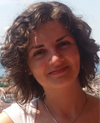
BMS Alumna (PhD 2022)
I was in my junior year of college when I began thinking of applying to math graduate school. One day in the winter of 2015, I was on my way to my advisor’s office when I saw a poster advertising the BMS in the math department hallway. Having enjoyed a wonderful stay in Berlin as part of a three-week German language course a year earlier, I was very intrigued by the possibility of returning to the city for my graduate studies. I checked the BMS website, read more about the program, and became even more interested in it: the website promised an English-language graduate program with a broad curriculum, a very international community, and a lot of support to help BMS students navigate their studies and life in Berlin. In the next few months, I asked several of my professors about the program, and based on their positive comments, I decided to apply.
My first real impression of the BMS was from the pizza dinner during the BMS Days the following February. Having just arrived from the USA, I was exhausted and jetlagged, and despite planning to stay for only a short while, I ended up staying almost until the end: the atmosphere was very friendly and it was really easy to talk to current students about their experiences at the BMS. That dinner was a very positive start to what turned out to be an amazing week, at the end of which I was convinced I wanted to join the program.
Two years later, I can say that being part of the BMS has been a wonderful experience. During this time, I have found that the BMS offers a lot more than just excellent education. The program also provides us with many great opportunities outside of the classroom. For instance, the BMS Friday colloquia and “What is…?” seminars help expand our mathematical backgrounds and let us connect with other members of the BMS community. Other examples include alumni events, through which we hear about possible career options, and Kovalevskaya lunches, which help us meet outstanding female mathematicians and learn about their paths through academia. The BMS also supports many student-organized social events, where we have a chance to get to know each other better and enjoy various activities together.
I’m always impressed with how much the BMS cares about both the academic success and the well-being of its students. Moving to a new country is always a challenge, but with the BMS One-Stop Office there to answer all my questions and help me with the initial bureaucracy, the transition was smoother than I had expected. Every time I’ve had administrative questions, the office has provided me with very detailed and helpful answers, tailored to my specific situation. Similarly, my academic mentors have been there to talk whenever I’ve needed advice about courses and requirements or to help plan my next steps. In addition, during my time as a student representative, I had the chance to see how the BMS works behind the scenes, how seriously input from the students is taken, and how committed the BMS is to diversity and equality.
One of my favorite aspects of the BMS is the community. The BMS has a very bright and diverse student body, and I’ve had a great time going out with fellow BMS students and exploring some of the many interesting things Berlin has to offer. Additionally, BMS students are very supportive of one another, both academically and personally. In many of my courses, I’ve had a chance to work on assignments or talk about the material with fellow BMS students. Through these discussions, I’ve not only understood the concepts much better but also got to see different ways of thinking about problems. BMS students are also very open to helping each other with everyday issues: whether you need to find a good dentist in Berlin or simply make a phone call in German, you will most likely find somebody who’s willing to help.
All in all, I’m very happy with my decision to become part of the BMS and would recommend the program to anyone looking for a unique math graduate school experience.
Simona Boyadzhiyska
PhD at FU Berlin in 2022, BMS Phase II Student (2018-22)
MSc at FU Berlin in 2018, BMS Phase I Student (2016-18)
BA Wellesley College in 2016
Published in August 2018





















